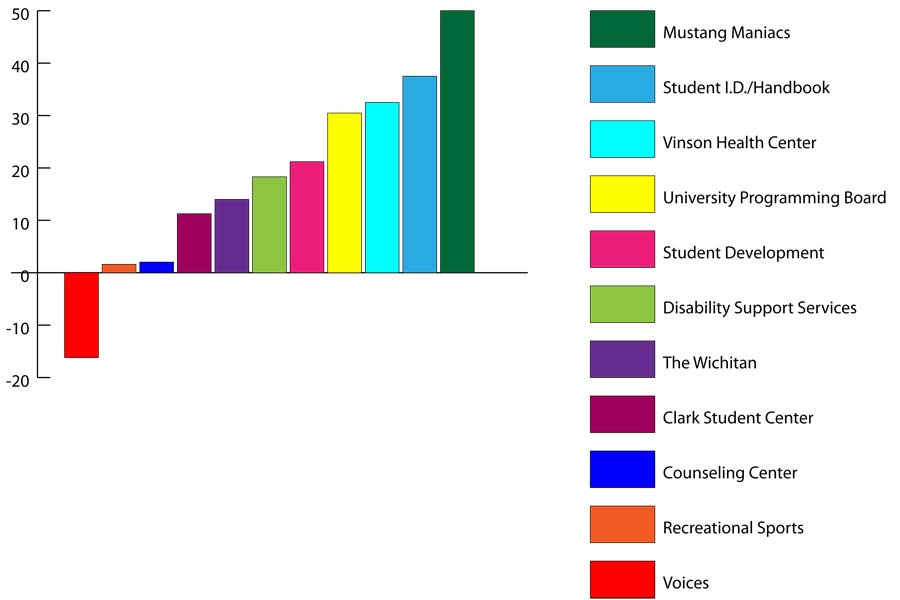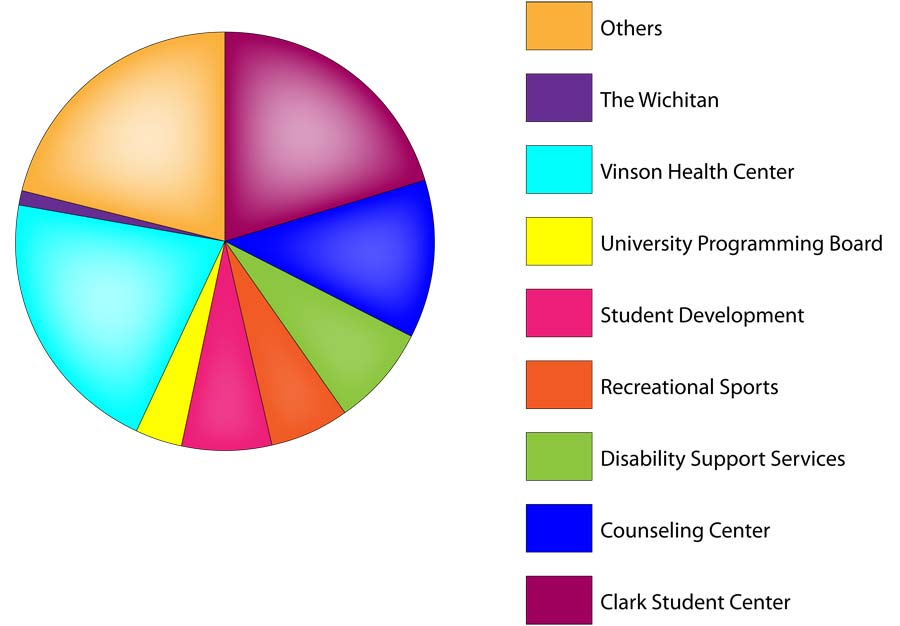
The Student Allocations Committee has increased the recommended budget for Student Services in the 2011-2012 school year by $263,441. This brings the estimated income to $2,415,765. Each student pays a Student Service Fee of $15.50 per semester credit hour, with a maximum charge of $250 for one semester. These fees provide funding for various student service programs including recreational sports, the music department and The Wichitan.
Every year the Student Allocations Committee considers requests by various departments and allocates funds based upon the demands and the amount of funds available.
The fairness lies within the structure of the process, said Dr. Keith Lamb, associate vice president of student affairs.
The Vinson Health Center asked for an increase of $126,557, the largest recommended this year, for a total budget of $516,218.
“We had money granted to add a part-time physician and expand hours,” said Peggy Boomer, Vinson Health Center director.
But according to Boomer, the increased amount was ultimately not given.
The Ultimate Frisbee Club was allocated $2,000. Last year it did not request funds.
“In the past, this committee has provided funding to different club sports at MSU, such as the Rugby Club,” Lamb said. “Most student organizations, though, choose to receive some funding through the Student Organization Fund program in our Office of Student Development and Orientation.”
The Voices budget was cut by $2,125 from last year’s total, bringing their recommended budget for the school year to $11,000. Voices requested $10,500.
Disability Student Services was granted a $29,865 increase from last year’s budget of $163,111.
“We requested more because DSS has continually had problems on the budget allotted,” said Debra Higginbotham, director of Disability Student Services. “It has stayed pretty low but the population hand the services have grown substantially.”
The extra money is needed to cover the expenses of personal services provided by contract labor, mainly sign language interpreters that the university is mandated to provide, Higginbotham said. It will also provide additional services for students who need assistance in performing and assessing classroom requirements.
Clark Student Center was allocated the second highest recommended budget with an increase of $51,183 from last year. They only requested $445,866, which is an over $8,000 decrease from 2010 to 2011.
From 2010 to 2011, Student Development received $136,915 from student services. This year they were granted $165,915, a $29,000 boost.
The first initiative behind the increased requested was to further enhance the amount of financial support available to registered student organizations on campus available through the Student Organization Fund, Matthew Park, director of student development and orientation, said.
The department also wanted to provide leadership development programs along with other resources for students and student organization such as workshops, conferences and travel opportunities.
Both of these initiatives stemmed from commitments made to the student body during the passage of the student athlete fee, Park said.
“The final justification for the increased requested was to provide additional student assistant hours to help coordinate and deliver the new services and programs in the areas of student leadership development, student organization support, and co-curricular organization management,” Park said.
Student wages in Student Development were increased by $15,000 from last year’s wages of $10,400.
Recreational Sports received exactly what they requested for its operation budget for the academic year in $155,296.
Over half of that budget, $78,192, is being used as administrative salaries for assistant director, Randy Canivel, and dean of University Wellness, Dr. Joey Greenwood.
With a $6,000 increase, the Counseling Center was also granted what they requested in the amount of $299,996.
The Artist-Lecture series got $81,700, Career Management Center was allocated $150,000, the cheerleaders received $59,485 and the Wai-Kun got $10,500 all the same as last year’s budgets.
Athletics budget was cut completely losing $100,000.
“Our students voted to assess themselves money to go to the athletic department,” said vice president of university advancement and student affairs, Dr. Howard Farrell. “Between $550,000 to $600,000 previous went to athletics. So students voted a fee (to be set) that would go directly to athletics and we would not longer take athletics from the student services.”
The Wichitan was allocated $28,500 for the 2011 to 2012 school year.
This is a $3,500 increase from last year.
















